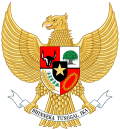Dutch East Indies period
The term "Public Works" is a translation of the Dutch term Openbare Werken which was called Water Management Works (Waterstaatswerken) during the Dutch East Indies era. [3] The Government Center, built by the Department of Transport and Water Management (Departement van Verkeer & Waterstaat, Dep.V & W), were led by a director, who oversees several departments (Afdelingen) and services (Diensten) in accordance with the duties / authorities of the department.
The department also covers the public works (openbare werken) including afdeling Waterstaat, with afdelingen (afd.) parts: public building (Lands gebouwen), road (Wegen), irrigation (Irrigatie), and sanitation (Assainering), Hydropower (Waterkracht), Constructie burreau (for bridges). The department also covers afd. Havenwezen (Harbor), afd. Electriciteitswezen (Electrical) and afd. Luchtvaart (Civil Aviation).
The regulations issued during the Dutch East Indies era for guidelines in carrying out tasks in the Public Works can be read in "A.W.R". 1936 B.W.R. 1934 and "W.V.O./W.V.V.".
Japanese Era
After the Dutch surrendered in the Pacific war in 1942, to Japan, the Indonesian area was divided by Japan into three administrative regions, namely Java/Madura, Sumatra and East Indonesia and there was no highest Government Center in Indonesia which controlled the government areas.
In the field of public works in each of the areas of the Japanese Military Government organization mentioned above, an organization in the Dutch East Indies era was needed and adjusted to the provisions of the Japanese side. The head office "V & W" in Bandung was renamed Kotubu Bunsitsu (交通部分室). Since then, the term 'Pekerjaan Oemoem' (PO), 'Oeroesan Pekerdjaan Oemoem' (OPO), 'Pekerjaan Umum' (PU), and doboku (土木) was commonly used.
Kotubu Bonsitsu in Bandung only has relations with the Government area in Java/Madura, while the relations with outside of Java did not exist. Public Works Organizations in the regions and residents generally stand on their own. There is some work implementation system that uses the system and the name of the Dutch Indies era, other than Japanese system.
Indonesian period
After Indonesia proclaimed independence on 17 August 1945, the Indonesian youths began to gradually seize power from the Japanese government, both in the central government (Jakarta / Bandung) and regional governments. After the Indonesian government formed the first Cabinet, the Minister began to formulate its organization and character. Public Works at that time (1945) was based in Bandung, taking the place of the former V & W building (known as Gedung Sate). [4]
When the Dutch wanted to restore governmental power in the Dutch East Indies before the war, they came to follow the Allied Forces into Indonesia. As a result of the urges of the Dutch government, there was a physical conflict with the Indonesian Youth who wanted to defend their homeland and the occupied buildings, including the "Gedung Sate" which had become the Public Works Department Building at that time (this historic event is known as the "incident" of 3 December 1945, marked as an anniversary in the Ministry of Public Works).
During the National revolution from 1945 to 1949, the Indonesian Central Government in Jakarta was forced to flee to Purworejo and then to Yogyakarta, as well as the Ministry of Public Works, and later on to Bukitinggi. After the Dutch Government in 1949 recognized the independence of the Republic of Indonesia, the center of the Indonesian government in Yogyakarta was moved again to Jakarta and the Ministry was reformed as the Ministry of Public Works and Energy of the United States of Indonesia.
Since 1945, the Public Works (PU) has often undergone changes in leadership and organization, according to the political situation at that time. In the beginning of the formation of the Unitary Republic of Indonesia, the composition of the Ministries changed due to the changing situation of the times.
Guided Democracy soon elevated the Ministry of Public Works into prestige as president Sukarno mandated the ministry's work in national construction to build a stronger nation. In the mid-1960s, there was a large Cabinet called the Dwikora Cabinet or the Cabinet of 100 Ministers. The Public Works Ministry also experienced organizational changes in the 60s and in the middle of the decade split into five distinct Ministries under the Dwikora Cabinet led under General Suprajogi, Coordinating Minister for Public Works. These ministries under the Coordinating Ministry were:
- Department of Electricity and Power (Departemen Listrik dan Ketenagaan), for electricity affairs
- Department of Public Highways (Departemen Bina Marga), for highway construction and maintenance
- Construction Industry Department (Departemen Cipta Karya Konstruksi)
- Water Resources Department (Departemen Pengairan Dasar)
- Trans-Sumatra Highway Department (Departemen Jalan Raya Sumatra)
After the G.30S PKI event, the Government immediately formed the Revised Dwikora Cabinet and among others, appointed Ir Soetami who succeeded Suprajogi as Coordinating Minister for Public Works.
The reunified public works ministry was formed during the Ampera Cabinet, which was the first Cabinet during the New Order era and Ir. Soetami remained in his post. With the Decree of the Minister of PUT dated 17 June 1968 N0.3 / PRT / 1968 and amended by the Ministerial Decree of PUT dated 1 June 1970 Number 4 / PRT / 1970, the ministerial structure was amended to suit the changing methods of construction of public works projects. As a further illustration of the division of tasks within the public works department, the public work duties at that time was handled and being managed by the regional authorities themselves.
This setup lasted until 2024, when the Ministry of Housing and Residential Areas was created.


